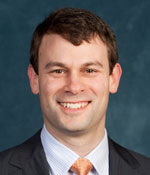Donald Siegel
Biography:
 Don Siegel is an Assistant Professor in the Departments of Mechanical Engineering and Applied Physics at the University of Michigan. His research lies in the field of computational materials science, with an emphasis on the development of novel energy storage materials and structural alloys for use in transportation and power generation. Prior to joining UM he spent four years as a Technical Expert at Ford Research and Advanced Engineering, where he led the Fuel Cell and Hydrogen Storage Materials Group. He has published ~25 peer-reviewed papers, filed 5 patent applications, and presented 25 invited lectures. He is a recipient of an MRS Graduate Student Award, the TMS/JIM International Scholar Award, a National Academies/NRC Fellowship, and a Special Recognition Award from the U.S. Council for Automotive Research. Dr. Siegel has played an active role in providing input to the Department of Energy on issues related to energy storage, having served as co-Chair for the FreedomCAR Hydrogen Storage Technical Team, Reviewer for the DOE Hydrogen and Vehicle Technologies Program, and participant in ARPA-E planning workshops. Siegel received a bachelor’s degree from Case Western Reserve University in 1995 and a Ph.D. from the University of Illinois at Urbana-Champaign in 2001, both in physics. His postdoctoral training was performed at Sandia National Laboratories and the U.S. Naval Research Lab. He is a member of the APS, MRS, and TMS. In 2010 he was named a Faculty Fellow of the Michigan Memorial Phoenix Energy Institute.
Don Siegel is an Assistant Professor in the Departments of Mechanical Engineering and Applied Physics at the University of Michigan. His research lies in the field of computational materials science, with an emphasis on the development of novel energy storage materials and structural alloys for use in transportation and power generation. Prior to joining UM he spent four years as a Technical Expert at Ford Research and Advanced Engineering, where he led the Fuel Cell and Hydrogen Storage Materials Group. He has published ~25 peer-reviewed papers, filed 5 patent applications, and presented 25 invited lectures. He is a recipient of an MRS Graduate Student Award, the TMS/JIM International Scholar Award, a National Academies/NRC Fellowship, and a Special Recognition Award from the U.S. Council for Automotive Research. Dr. Siegel has played an active role in providing input to the Department of Energy on issues related to energy storage, having served as co-Chair for the FreedomCAR Hydrogen Storage Technical Team, Reviewer for the DOE Hydrogen and Vehicle Technologies Program, and participant in ARPA-E planning workshops. Siegel received a bachelor’s degree from Case Western Reserve University in 1995 and a Ph.D. from the University of Illinois at Urbana-Champaign in 2001, both in physics. His postdoctoral training was performed at Sandia National Laboratories and the U.S. Naval Research Lab. He is a member of the APS, MRS, and TMS. In 2010 he was named a Faculty Fellow of the Michigan Memorial Phoenix Energy Institute.
Statement:
I firmly believe that technological and scientific innovation, if fostered and properly directed, have the potential to overcome the most pressing issue of our time: the development of renewable, environmentally-benign power sources. As the gateway to the industrial and applied physics communities, and as the largest APS unit, FIAP is uniquely positioned to serve both as a forum to foster this innovation, and as a conduit for the larger physics community to provide advice to policy makers on technologies relevant for our future energy needs and economic development. As a member-at-large I would work to bolster both of these functions by:
- Ensuring a robust and relevant set of FIAP-sponsored Focus Sessions at APS meetings (including an emphasis on energy applications)
- Promoting collaboration and interdisciplinary interaction between FIAP and applied units of sister societies such as the MRS, IEEE, and ACS
- Exploring the development of externally funded faculty/industry exchange programs similar to the recently established ASEE/NSF postdoctoral fellowships.
Having worked in universities, national labs, and in industry, I have first-hand knowledge of the culture and constraints of these environments. Given this background I believe I am well-prepared to represent the interests of applied physicists regardless of their employer.
